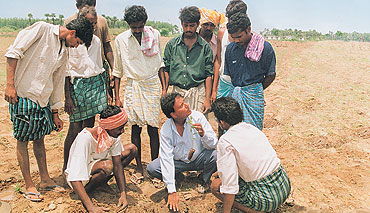maintenance, marketing and
funds management. The creation of village-level natural resource management committees,
comprising local farmers, has institutionalised this intervention.
At the heart of this comprehensive greening
project is ITC’s state-of-the-art biotechnology-based research centre at
Bhadrachalam. The centre enables the Company to make available high yielding,
disease-resistant clonal saplings to traditional farmers and wasteland owners, thus
providing them attractive land-use alternatives. So far, 66 million saplings have been
planted over 19,500 hectares through farm and social forestry programmes, generating
employment opportunities for nearly 200,000 people. The pace and scope of these
plantations has been significantly enhanced. 31 million saplings were planted during
2003–04. This has also enabled the creation of substantial employment during
pre-monsoon lean periods when agricultural employment is at its lowest. Consequently, the
regular seasonal migration in quest of labour for livelihood has also been curtailed. In
turn, there has also been an all-round improvement in health, nutrition and education.
The benefits of this strategic initiative
of ITC are much more pervasive. This effort contributes to in-situ moisture conservation,
groundwater recharge and significant reduction in topsoil losses due to wind and water
erosion. With poor households having access to their own woody biomass under ITC’s
social forestry programme, the pressure on public forests has also appreciably reduced.
The leaf litter from multi-species plantations and the promotion of leguminous inter-crops
enable constant enrichment of depleted soils. These forests enable sequestration of
carbon, thereby strengthening the plant-led life support system.
ITC’s bold engagement across the
entire value chain has created opportunities for a sustainable partnership. Only a company
with a ‘commitment beyond the market’ could have dared to passionately pursue
the objective of adding value to native wood fibre, when conventional wisdom mandated
exiting this business in the absence of cost-effective fibre.
‘‘If a company like ITC had chosen the easier path of importing
pulp to support a 300,000 tonne mill based on virgin pulp, it would have meant foregoing
the opportunity to create 75,000 hectares of sustainable plantations, 27 million
person-days of employment and nearly Rs 600 crores in foreign exchange
annually.’’
Y. C. Deveshwar, AGM 2004 |
The Company has committed itself to
building competitiveness as a critical responsibility towards creating the socio-economic
and ecological multiplier. Alongside investment in augmenting capacity and inducting
cutting edge process technology, ITC set up an Elemental Chlorine-Free (ECF) pulp mill at
Bhadrachalam, going ahead of the standards mandated by the Ministry of Environment and
Forestry. This pulp mill is the only one of its kind in the country and conforms to
world-class environmental standards. ITC has also invested in co-generation to add to the
efficiency of energy management and to minimise environmental impact.
The growing competitiveness of the
Company’s paperboards business and its increasing market strength provide the impetus
for the Company to scale up the afforestation endeavour to cover over 100,000 hectares by
planting 600 million saplings over the next 10 years. Such a scale will make procurement
of industrial timber exclusively from sustainable sources a reality within a decade. It
will also create employment opportunities for nearly 1.2 million people. The forestry
project will also transform ITC into a carbon-postive corporation. |

